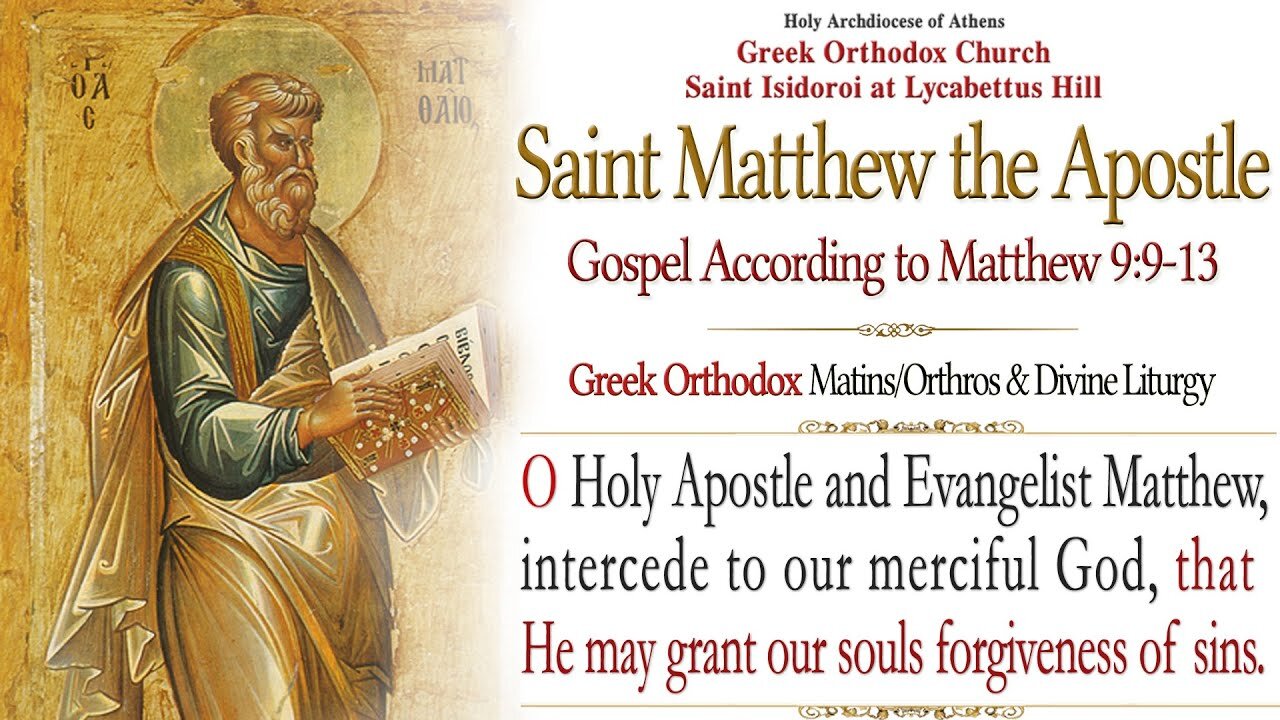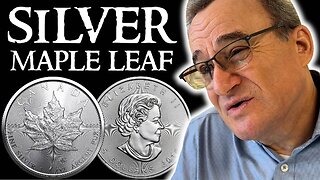Premium Only Content

November 16, 2021, APOSTLE & EVANGELIST MATTHEW | GREEK ORTHODOX DIVINE LITURGY LIVE STREAM
The Holy Apostle and Evangelist Matthew, was also named Levi (Mark 2:14; Luke 5:27); he was one of the Twelve Apostles (Mark 3:18; Luke 6:45; Acts 1:13), and was brother of the Apostle James Alphaeus (Mark 2:14). He was a publican, or tax-collector for Rome, in a time when the Jews were under the rule of the Roman Empire. He lived in the Galilean city of Capernaum. When Matthew heard the voice of Jesus Christ: “Come, follow Me” (Mt. 9:9), left everything and followed the Savior. Christ and His disciples did not refuse Matthew’s invitation and they visited his house, where they shared table with the publican’s friends and acquaintances. Like the host, they were also publicans and known sinners. This event disturbed the pharisees and scribes a great deal.
Publicans who collected taxes from their countrymen did this with great profit for themselves. Usually greedy and cruel people, the Jews considered them pernicious betrayers of their country and religion. The word “publican” for the Jews had the connotation of “public sinner” and “idol-worshipper.” To even speak with a tax-collector was considered a sin, and to associate with one was defilement. But the Jewish teachers were not able to comprehend that the Lord had “come to call not the righteous, but sinners to repentance” (Mt. 9:13).
Matthew, acknowledging his sinfulness, repaid fourfold anyone he had cheated, and he distributed his remaining possessions to the poor, and he followed after Christ with the other apostles. Saint Matthew was attentive to the instructions of the Divine Teacher, he beheld His innumerable miracles, he went together with the Twelve Apostles preaching to “the lost sheep of the house of Israel” (Mt. 10:6). He was a witness to the suffering, death, and Resurrection of the Savior, and of His glorious Ascension into Heaven.
Having received the grace of the Holy Spirit, which descended upon the Apostles on the day of Pentecost, Saint Matthew preached in Palestine for several years. At the request of the Jewish converts at Jerusalem, the holy Apostle Matthew wrote his Gospel describing the earthly life of the Savior, before leaving to preach the Gospel in faraway lands.
In the order of the books of the New Testament, the Gospel of Matthew comes first. Palestine is said to be the place where the Gospel was written. Saint Matthew wrote in Aramaic, and then it was translated into Greek. The Aramaic text has not survived, but many of the linguistic and cultural-historical peculiarities of the Greek translation give indications of it.
The theological content of the Gospel, besides the Christological themes, includes also the teaching about the Kingdom of God and about the Church, which the Lord sets forth in parables about the inner preparation for entering into the Kingdom (Ch. 5-7), about the worthiness of servers of the Church in the world (Ch. 10-11), about the signs of the Kingdom and its growth in the souls of mankind (Ch. 13), about the humility and simplicity of the inheritors of the Kingdom (Mt. 18:1-35; 19 13-30; 20:1-16; 25-27; 23:1-28), and about the eschatological revelations of the Kingdom in the Second Coming of Christ within the daily spiritual life of the Church (Ch. 24-25).
The holy Apostle brought the Gospel of Christ to Syria, Media, Persia, Parthia, and finishing his preaching in Ethiopia with a martyr’s death. This land was inhabited by tribes of cannibals with primitive customs and beliefs. The holy Apostle Matthew converted some of the idol-worshippers to faith in Christ. He founded the Church and built a temple in the city of Mirmena, establishing there his companion Platon as bishop.
Watch live from the Greek Orthodox Church of Saint Isidoroi at Lycabettus Hill, the Matins/Orthros and the Divine Liturgy .The small church of Saint Isidoroi belongs to the Holy Archdiocese of Athens and is located on the west side of Lycabettus Hill in Athens, built inside the largest cave on the hill. According to tradition, this cave was a place of ascetic life of the Christians of the first centuries.
-
 2:26:51
2:26:51
Greek Orthodox Church St. Isidoroi, Athens, Greece
2 years agoNovember 5, 2022, Sts. Galaction & Episteme | Greek Orthodox Divine Liturgy
79 -
 6:41
6:41
Silver Dragons
17 hours agoCanadian Silver Maple Leaf Coins - Dealer Reveals Everything You NEED to Know
6722 -
 8:42
8:42
Dangerous Freedom
15 hours ago $0.85 earnedThe M&P Competitor SHREDS—But Did Smith & Wesson Screw It Up?
6.69K1 -
 1:12:50
1:12:50
MTNTOUGH Fitness Lab
15 hours agoSTOP Living in Fear: Why Some People Rise From Tragedy AND OTHERS DON'T | Ryan Manion
4.32K -
 8:03
8:03
Alabama Arsenal
1 day ago $0.34 earnedWoox Bravado | Modern Features Meet Timeless Style
8.11K1 -
 49:43
49:43
Vedic compatability astrology
12 hours agoCoffee w/ Kingpins Katie Haley & Her Book!
4.97K1 -
 2:49:10
2:49:10
TimcastIRL
12 hours agoElon Musk Says X Hit By MASSIVE Cyberattack From Ukraine, Rumble Hit Too w/Ben Davidson| Timcast IRL
246K125 -
 2:05:10
2:05:10
Kim Iversen
15 hours agoFree Speech for Me, But Not for Thee: Trump Admin’s Protester Crackdown Sounds MAJOR Alarms
94.9K476 -
 1:29:26
1:29:26
Glenn Greenwald
15 hours agoICE Detains Permanent Resident for Protesting Israel; European Leaders Make Maniacal Rearmament Vows They Cannot Keep | SYSTEM UPDATE #421
168K294 -
 1:02:56
1:02:56
Donald Trump Jr.
17 hours agoUSAID Slush Fund Slashed, X Cyberattack, Plus Interview with Nate Morris | Triggered Ep.223
156K186